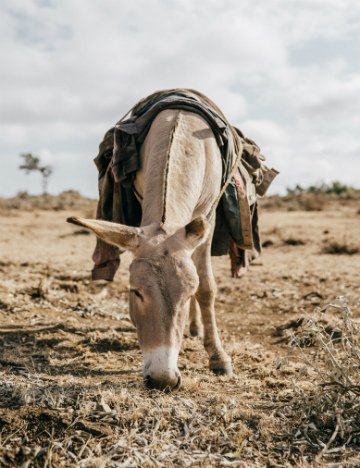World Donkey Day – the skin trade remains a grave threat
Jonathan Collier, Global External Affairs Advisor for Brooke marks World Donkey Day 2020 (8 May) by taking stock of the damaging trade in donkey skins.
Tigers, elephants, rhinos, bears, pangolins – and now donkeys. The latest animal to be caught up in the barbaric trade in animals is one that is vital for agriculture and livelihoods in the Global South. In the face of the Covid-19 crisis and its apparent links to wet markets, how can we speak of donkey skins, lying in putrid pools of blood on abattoir floors before being shipped thousands of miles to be boiled for potions and creams, without feeling distinctly uneasy?
Donkeys the world over are facing a crisis: hundreds of thousands are being slaughtered to feed the demand for their skins. The traditional Chinese medicine product ejiao, derived from the boiled skins of donkeys, has been rebranded and marketed to appeal to a much-increased consumer base, leading to an incredible surge in demand. As a result, communities that depend on donkeys for their livelihoods are facing catastrophe..

Powerful Chinese companies, such as Dong EE Jiao from Shandong in North-Eastern China, are struggling to keep up with demand for their products. A supposed remedy for all manner of maladies, ejiao also now doubles up as a beauty product. Without the ability to meet demand through the donkey stock in China, companies like Dong began looking abroad for their raw material.
The scourge of ejiao now stalks dozens of countries across the globe. In parts of Africa donkey populations have been decimated; for instance, the number of donkeys in Kenya has halved in the last ten years. On trends such as these entire populations are on course to be wiped out in a number of countries.
A working donkey carries water, firewood, food, materials for construction, and other essential items for millions of poor people across Asia, Africa and Latin America. Deprived of donkeys, communities in remote, marginalised parts of the world struggle to get by. One effect is that children who would otherwise go to school are now obliged to help their parents with whatever load needs to be transported. Education – and a better future – goes out of the window.
A further issue of the trade is that unsanitary cross border smuggling of live donkeys and skins brings with it a huge risk of disease spread. And we now know all too well the potential consequences of that.
That is why it is crucial that the donkey skin trade be stopped in its tracks – and the fightback has already begun.
Two weeks ago in Kenya the Government put into law its earlier declaration banning the trade in donkey skins. The four slaughterhouses operational in Kenya are now prohibited from slaughtering donkeys for their skins. This is a big breakthrough against the financial muscle of the industry, and the Kenyan Government should be applauded for standing up for its donkey-owning communities.
Brooke has been instrumental in bringing about this ban. Working with partners and community networks of donkey owners, Brooke persuaded the Ministry of Agriculture to recognise that the trade in donkey skins was destroying the indigenous donkey population and putting the livelihoods of millions of its citizens in grave peril.
The campaign to pressure the Government of Kenya to ban the slaughter of donkeys has involved a number of different groups, including supporters from outside of Kenya. As this campaign gathers pace, more support will be required. In the face of powerful, wealthy slaughterhouse owners we must remain vigilant, and continue to apply pressure on the Kenyan authorities to enforce the ban.
Our success in Kenya is just the beginning. This is a global campaign that seeks to stop a global trade. Kenya has been the starting point, but there are other successes that can be built on, and turned into total victories. In West Africa several nations have either banned the trade or are in the process of doing so. Regional bodies can be persuaded to make binding commitments to ending the slaughter.
We know that the demand for donkey skins will continue, however. That’s why one of the three elements of our strategy to win this fight is to show consumers of ejiao in China that their consumption badly hurts people in other parts of the world.
This element requires a long-term view and patience. And that means in the short-term we need to replicate the kind of action we’ve seen over the last two weeks in Kenya: bans on the trade and enforcement of those bans. We can categorise this work as regulation and protection. With the help of community groups and local organisations, supporters around the world and a broad array of influential figures, we know we have a road map.
If we can persuade the authorities in individual countries to do the right thing and ban slaughter; if we can speak to regional and continental bodies, such as the African Union, enlisting their muscle to get behind the bans and agree on regional and continental-wide approaches to the crisis; and finally, if we can get world leaders to show leadership in supporting this most just of causes, we can end the slaughter of donkeys for good, safeguarding the livelihoods of millions in the process.
Join the campaign and together, let’s save donkeys and the communities that rely on them. Sign the petition here.
